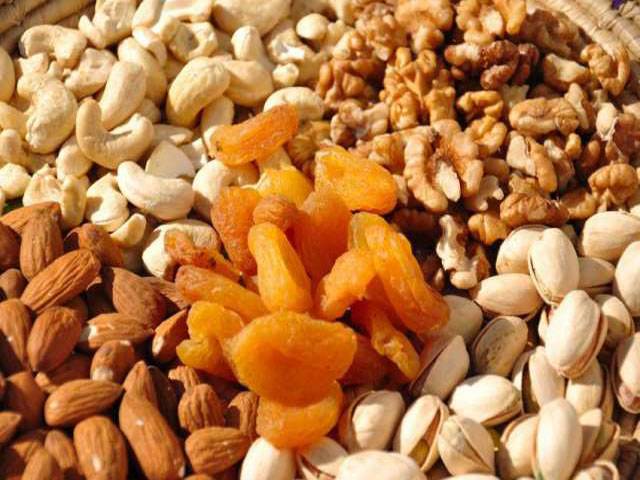ISLAMABAD - The prices of dry fruit has almost gone out of the reach of a common man with the increasing demand, surge in inflation and decreasing temperature in the federal capital, reveals a survey conducted by APP.
With the increasing demand, the prices of dry fruits have also increased manifold and buying dry fruit has become only a dream of the low income people.
Prices of dry fruits in Islamabad are high as compared to the areas where dry fruit is available in abundance.
The price of pine nuts locally known as chilghoza has jumped to Rs 5,000 per kg from Rs 4,000 a few months ago. The main reason of price increase is strict checking at Pak-Afghan border and high rates of customs duty. Also Chilghoza is being imported by China from Afghanistan.
An importer of dry fruit told that the market rates of dry fruits are doubled till reaching the capital. Almonds in shells from Iran or Afghanistan are bought at Rs 700 per kg in Quetta dry fruits market and shipped northward to sell at Rs1200 to Rs1600 per kg in Islamabad.
An Aabpara based merchant of dry fruit told APP that Chilghoza is produced in Waziristan, Kalash, and
Gilgit-Baltistan but the quality is very low due lack of proper caring and absence of polishing, frying and other essential equipments.
The local production could get a significant boost if proper facilities were provided. The quality Chilghoza trees should be grown at local level for increasing production.
He said the prices of other dry fruits like cashew nut, pistachio, and walnuts have also been increased due to problems in importing the commodity and corresponding increase in demand.
Meanwhile, most of the traders blame short supplies from main producing countries including Afghanistan and Iran due to multiple reasons.
Almond mostly produced in the cold areas of Balochistan, the production rate has been affected due to drought in region since many years the result is that to increase the rate to 1600 per kg.
Similarly, the prices of cashew are Rs 800 per kg at the arrival stage to markets but in federal capital these are sold at Rs1600 per kg. Whole walnuts, grown in Gilgit-Baltistan are being sold at Rs480 and the rate of imported commodity is Rs700/kg.
While the unsalted pistachio in shells is being sold at Rs 1,1oo in wholesale markets of other parts of the country, it costs Rs 1,600 in the capital city.
The cost of favorite winter-chew further ticks up with packing. Dry fruit prices are even higher at superstores where these sold in attractive packaging.
It is commonly observed in our society that during winter, people present dry fruits to their guests as hospitality.
In the chilly weather, the number of vendors selling dry fruits has also increased as they can be seen along every nook and corner of road, near bus stands and in markets.
Due to Medical experts say these dry fruits contain great amount of energy.
The most favorite and popular dry fruit thus remains the peanut due to low price then other out of range fruits.Vendors serving hot peanuts roasted in sand are the charm of the winter in the city. Late night gatherings of friends and family are not complete without peanuts.
Be it dates, peanuts, coconuts or dried apricots and figs, rates of the favorite winter munch have taken flight.






